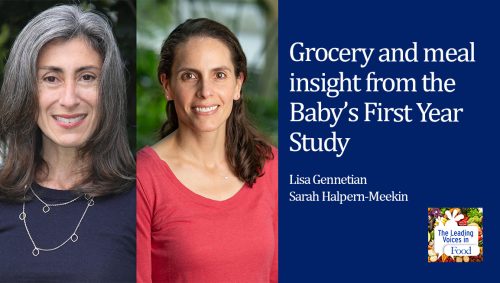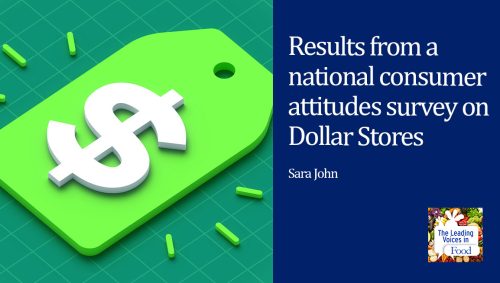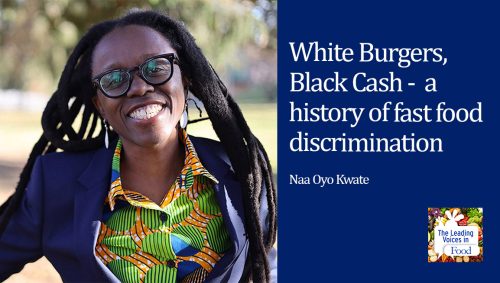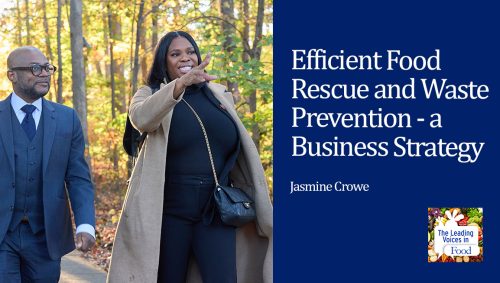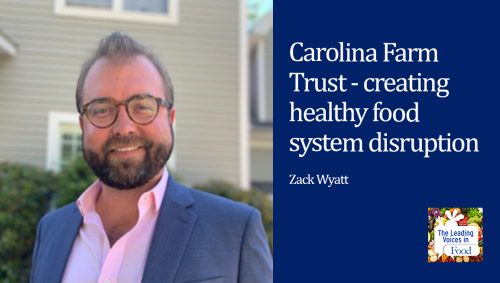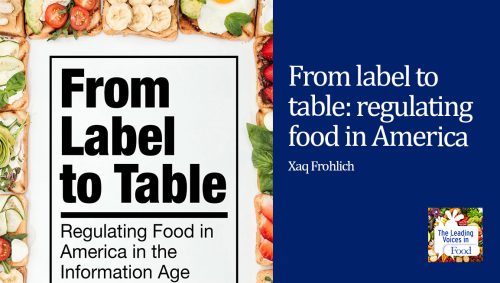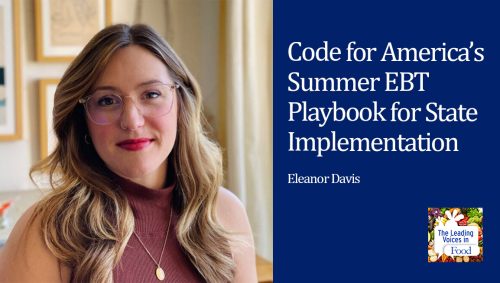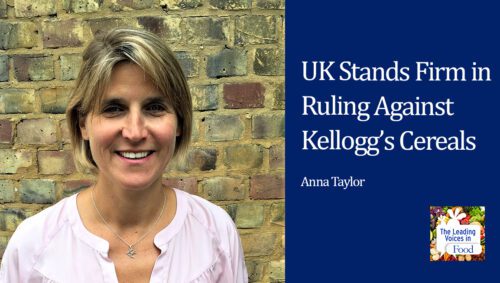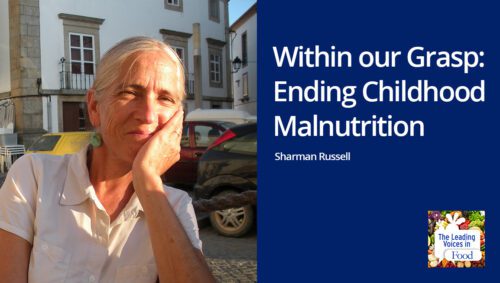The Leading Voices in Food
E97: Can a New Commission Jumpstart Progress Towards Zero Hunger?
Progress towards Sustainable Development Goal 2: Zero Hunger is stalling, and the Covid-19 Pandemic is erasing the progress of the last decade in many parts of the world. Is it possible to re-energize on this issue? Could a new commission make a difference? Today, we’re talking with the authors of a new report entitled “High Level Commissions and Global Policymaking Prospects for Accelerating Progress Toward SDG2.” Geoff Gertz is a fellow in the Global Economy and Development Program at the Brookings Institution. And Sarah Zoubek, is the Associate Director of the World Food Policy Center here at Duke University.
Subscribe: Apple Podcasts | TuneIN | Google Podcasts | SoundCloud | PocketCasts | Radio Public
Tags: Diet & Nutrition | Equity, Race & Food Justice | Food Insecurity | Food Policy | International Food & Ag Policy |

Geoffrey Gertz is a Fellow in the Global Economy and Development Program at the Brookings Institution and a Research Associate at the Global Economic Governance Programme in Oxford. His research focuses on international political economy, including the politics of trade and foreign investment, geoeconomic competition, investor-state dispute settlement (ISDS), commercial diplomacy, and private sector development in fragile states. He earned an MPhil and DPhil in International Relations from the University of Oxford, and a BA in Economics from DePauw University.
Sarah Zoubek oversees the execution of the WFPC’s strategic plan and daily operations, including managing the global portfolio of projects. Sarah is an experienced research analyst, project manager, and strategy consultant whose work has concentrated on food production value chains and producer incentives for sustainable business practices. Her previous work includes identifying potential levers to aid adoption of sustainable practices within the Iowa corn and Brazilian beef value chains, designing economic case studies featuring Midwestern producers who successfully employ soil health practices, and aiding the launch of a nationwide soil health campaign. She earned a Master of Environmental Management degree at Duke University’s Nicholas School of the Environment in 2013. Prior to her graduate studies, Sarah worked at New York Sun Works (NYSW), a non-profit organization that teaches environmental science through the lens of sustainable food production. She also holds a BA in English from Yale University.
Interview Summary
What was the original idea behind studying the potential and the limits of a new High Level Commission Focus on Sustainable Agriculture and SDG2? Sarah, let’s begin with your thoughts.
Sure. In the summer of 2019, there was a group of agricultural development experts that came together and they said, global progress is stalling for achieving Sustainable Development Goal Number two. So what can we do to catalyze action? What is something different we could try? Someone pitched the idea of a high level group of individuals coming together in sort of a commission style. And they had seen some success by high level groups like the Lancet Commission on investing in health, for example, and wondered how that could apply to the food security and agriculture space – if something there could be successful.
So, Geoff, what are your thoughts on this? And what do we mean by high level? Does this mean experts on a topic? Does it mean heads of agencies and countries? Does it mean heads of States? What does this mean, high level commission?
That’s a great question. So the commissions we’re talking about are made up of individual participants. We’re not looking at groups that are business corporations or international organizations that are part of some sort of national coalition. Individuals who participate are individuals who are prominent enough that they have some professional reputation outside of their immediate sphere. So this can be heads of state or former heads of state cabinet level members, heads of large businesses, heads of international organizations. That’s really the type of person that we’re looking at here.
And Geoff what roles and functions do high level commission serve?
So the key point in understanding the rules these commissions play and how they really work is that the commissioners themselves have no formal authority. These commissions are not issuing grants. They’re not implementing their own projects. Really what they’re doing is working through communications and advocacy, to convince other people how to act. In the report we go through several different ways that commission have functioned.
This role we see is that they focus on promoting normative change – really trying to change how policy makers and the public think about important transnational challenges. They also generate and sympathize new knowledge. This is bringing new research to bear on the questions and right synthesizing what else has been done by academic experts. The third function we look at is catalyzing political action through short-term focus on how to convince policy makers and other people who have political power in these arenas that they need to take action on certain challenges. Fourth, they also facilitate coordination among actors. And then finally, all of these commissions can serve as a test run for international negotiation. In a commission, you’ll a lot of the politics in a less high stress, less high stakes manner that can then inform subsequent formal international negotiation.
Sarah, back to the point that you made when you let off this conversation, is it fair to say that given that agriculture development is not having as much impact as a needs to, if SDG2 is going to be accomplished, that the only way to do this is to get people at the very highest levels together in order to create visibility and impact ultimately, do you think that’s fair to say?
Well, I think that was one idea, and there’s clearly many levers that you can try to pull. Certainly there’s an attempt to try to have more bottom up inclusive approaches to fixing problems now. But I think the idea was let’s try this as another tool in the toolkit and see what could potentially happen. And that was the idea behind Brookings and Duke coming together to try to investigate.
Geoff, I’d like to also hear your thoughts on how these commissions have impact. And can you give an example of a commission say that was successful, maybe one that wasn’t so successful?
So that’s a real tough question. One we kind of grappled with a lot at work, because tracing the impact of these commissions is difficult. It’s hard to know how the world would have looked differently if these commissions didn’t exist. One thing that we found is that for a lot of commissions, there’s not huge evidence of impact at all. Commissions involving quite high level people come and go, and don’t really leave much evidence in media mentions and citations in policy and academic literature. A lot of commissions seem to be quickly forgotten after they wrap up. In some ways, this reflects with one of our interviews head of this project told us, which is that a high level commission is what you want to do when you want to look like you’re doing something, but don’t actually want to do something.
For a lot of these commissions, what we found is that they didn’t necessarily have a real, clear theory of change for how they’re going to have an impact. Some of them were more successful, and some were very successful. So I think Sarah already mentioned one that was very successful was the Commission for Investing in Health. That’s the only one. It is a very interesting case. Probably the most famous one of the most successful commission ever is the Brundtland Commission, which was a commission back in the 1980s, organized to the UN that really defined and popularized the concept of Sustainable Development. And so it’s this idea that now just completely permeates international development landscape.
Commissions that were maybe less successful are those that face real challenges. It’s often because they didn’t have a clear political strategy from the get-go. We looked at the report from the Aspen Food Security and Strategy Group as a useful discussion forum. A lot to participants found it useful in that sense, but they never really had a clear strategy for how they’re going to take the discussion that they’re having within that commission to a broader political and public audience. And that’s where we see a lot of commissions fall short.
So after all the research that went into this report, is it possible to know, is there a recipe for success and what can help make a commission successful in the long run?
There’s definitely not a perfect recipe because there will always be things like world events and timing creating impact. And so you could have all the recipe correct and it’s good, and you could still get thrown off. But there are some things you can do to increase your chances of a commission being successful.
Geoff mentioned one of them was just starting with a clear mandate and problem statement. And that sounds like a no-brainer, but there were certainly some commissions we saw that when it’s not clear – you just actually spend the majority of the time agreeing on the problem statement instead of doing the work. And then also making sure that it is demand driven – that people actually really see a need for the commission and it’s not just three people behind closed doors deciding that this would be a great idea.
Beyond that, it really hinges on the identity of the chairperson. You could have more than one, but they are really this kind of gravitational force that attracts other members to join. Who you invite really should be your theory of change as well who serves on the panel, because they’re going to be your best ambassadors. You really want to hink of those individuals as representing networks of people to try to increase their reach. And then certainly you need adequate funding because you’re going to need people to travel and you need, since these are often very people that are on the commission, you’re going to need staff to support them and do some of the research.
And then beyond that things just like clear deadlines, benchmarks, in-person meetings to do some of that relationship building and get people’s attention focused. Although that’s a little harder now in a zoom only pandemic world. But then also getting buy-in from relevant stakeholders throughout. We definitely saw some examples where that didn’t happen. Like the World Commission on Dams, for example. Initially they involve developing countries like China and India, but then as the work progressed, those countries weren’t really pleased with the direction. Then they backed out and it wound up being a very sort of NGO and civil society-led process. And so they didn’t really have a good process for managing internal dispute. Then ultimately two countries that were super critical to making change didn’t pay attention to the commission’s recommendations. So the internal politics piece and having processes for getting through that is pretty critical.
You also really need to say something new and we heard a lot, nobody wants another review of the evidence. You’ve got to say something clear and bold and different. And then lastly, there’s a great quote by Gro Harlem Brundtland who said, “A good report is not the end, but the beginning.” A lot of these commissions put together recommendations in a report and then leave it there, but the impact is better achieved if you really have a long follow up period. And like Geoff mentioned again, the Atlantic Commission on Investing in Health, they planned two years of follow-up. So lots of communication strategy, hosting events all over the world. There’s definitely a number of things you can do to make it more successful.
Sarah, some of the things you just mentioned that would be pertinent to commissions of any sort. So let’s talk a little more specifically about what a commission could do to help catalyze action in the food and agriculture space. So what are your thoughts on that?
Well, there are definitely some cautions. There are a large number of actors in the space. We’re also moving into a time, like I said, where people are demanding more bottom up and inclusive approaches rather than ones that could be perceived as really top down and elite. We’re trying to think more holistically about development agendas. There’s definitely a danger of biting off too much, but keeping all of these in mind, we ultimately decided based on our research and our interviews, that if you did it properly, a commission actually really could be helpful. And we came up with a couple ideas. One is that there’s a UN Food System Summit planned for 2021 and really was all the other events being canceled for the foreseeable future because of the pandemic. It’s kind of the go-to event for food systems and a huge moment for focusing energy and attention. The summit really is going to try to drive a change in the discourse, but also really get political commitments from countries. They’ve already developed a group of champions that are individuals who represent large networks, but we really think launching some kind of commission in tangent with this and coordinating closely with them could really help to forward the Summit’s outcomes.
Another option would just be proposing reforms to the institutional setup for food security and agriculture internationally. It’s kind of a high risk high reward proposal because it would really be a massive lift and you’d need to have buy-in from the UN Secretary General and some other powerful government. But so much of what we hear in the food and Ag space is how fragmented it is, how there’s so many overlapping mandates of different agencies and the financing needs to be better targeted and coordinated like the World Food Program, starting to do more development oriented work instead of just emergency relief. And that’s really the role of some of the other roam based agencies traditionally. We kind of need a step back and an examination of who’s doing what and how to better specialize amongst those groups. And a lot of those groups were launched around emergency events. The massive shifts in the world that we’re seeing through COVID may actually open people up to thinking differently about how those institutions are structured.
Finally we think a more narrow focus on a Sustainable Development Goal Two at a global level could be helpful. Some sort of specific topic with a defined problem statement and theory of change could maybe produce some traction. Two ideas that came up for us were a focus on food security and conflict, especially since some of the latest FAO reports show that conflict is one of the key drivers of food security globally. The other one would be making a political case for increased investment in agriculture.

